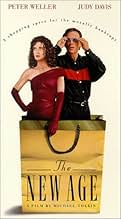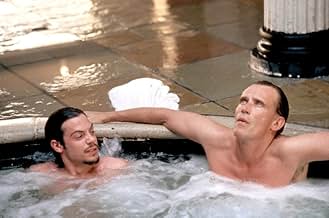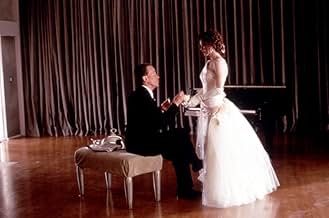PUNTUACIÓN EN IMDb
5,6/10
1,3 mil
TU PUNTUACIÓN
Añade un argumento en tu idiomaEpisodic story about a yuppie couple who're going broke, and can't decide if they want to stay together - but openly sleep around and experiment with different lifestyles, or not.Episodic story about a yuppie couple who're going broke, and can't decide if they want to stay together - but openly sleep around and experiment with different lifestyles, or not.Episodic story about a yuppie couple who're going broke, and can't decide if they want to stay together - but openly sleep around and experiment with different lifestyles, or not.
- Premios
- 1 premio en total
Reseñas destacadas
The previous reviewer's comments mysteriously do not allude to the terrific humor of this film. It is a clever, understated, totally deadpan comedy. If you like black, dry humor, this film is for you. At the same time it skewers the vapidly self-affirming culture of the wealthy, new age set. Slowly, Peter Weller and Judy Davis's characters' natures are purified in the furnace of self-destruction, until they discover their true selves -- mediocrity and greed, which lately pretended to be new age spirituality. A succession of fatuous gurus pushes them down the slope of destruction, until finally Samuel Jackson, in a fabulous cameo, teaches Peter Weller how to attain ultimate truth through techniques of visualization. By this point, the Davis-Weller characters have lost their jobs, their wealth, their "friends", their home, their failed business, and their relationship (did I mention the affairs?), and, perhaps, all illusions that there was anything at their core.
With the exception of one or two scenes, everything in this film is deliciously subtle and understated, but all the more wickedly funny for it. You might not realize how good it is at first. A second viewing will really help your appreciation of it.
If this film doesn't make you laugh, grasshopper, then perhaps you still do not know yourself.
With the exception of one or two scenes, everything in this film is deliciously subtle and understated, but all the more wickedly funny for it. You might not realize how good it is at first. A second viewing will really help your appreciation of it.
If this film doesn't make you laugh, grasshopper, then perhaps you still do not know yourself.
The response to this film was a little more negative than I expected. I liked the film better than Tolkin's "The Rapture." It's one of my favorites to watch for non-serious viewing.
The film has a quirkiness, even a spookiness, that, apparently, many dislike and don't understand. I wanted to recount the plot; however, since that's not desired, I don't see why other reviewers think the plot is so implausible.
Peter Weller's and Judy Davis' characters seem to be mismatched partners, but is that so implausible? This dissonance was probably intended, but disliked by many viewers. Anyway, the main characters compromise themselves in many ways: I think Peter and Judy do well in the movie.
I also like Adam West in his small part, and the under-rated Patrick Bachau plays his part as a new-age guru with urbane spookiness. Corbin Bernsen has a small part at the beginning as the boss for Peter Weller's character (Weller's character is conveniently named "Peter.")
Finally, I like the depictions of certain new-age ceremonies and personalities--this is rare in movies.... I think the movie is thoughtful. It does not have much action, but don't most action films today flagrantly violate the law of "suspension of disbelief?"
This film will not be liked by the multitude in America with the attention span of a gnat.
The film has a quirkiness, even a spookiness, that, apparently, many dislike and don't understand. I wanted to recount the plot; however, since that's not desired, I don't see why other reviewers think the plot is so implausible.
Peter Weller's and Judy Davis' characters seem to be mismatched partners, but is that so implausible? This dissonance was probably intended, but disliked by many viewers. Anyway, the main characters compromise themselves in many ways: I think Peter and Judy do well in the movie.
I also like Adam West in his small part, and the under-rated Patrick Bachau plays his part as a new-age guru with urbane spookiness. Corbin Bernsen has a small part at the beginning as the boss for Peter Weller's character (Weller's character is conveniently named "Peter.")
Finally, I like the depictions of certain new-age ceremonies and personalities--this is rare in movies.... I think the movie is thoughtful. It does not have much action, but don't most action films today flagrantly violate the law of "suspension of disbelief?"
This film will not be liked by the multitude in America with the attention span of a gnat.
"The New Age" is half fascinating and half dull. It's very much a comedy, albeit a very dark and satirical one. But it's emotionally distant, and has the distinct sense of being a film about rich people made for and by other rich people. It's about a world with a built-in sense of the ridiculous in the everyday, so much so that it's hard to know what's meant to make us laugh and what's designed to reflect real life. The leads are good. Peter Weller and Judy Davis disappear into their characters, Davis to the point I really didn't recognize her. The best and most entertaining part of the film is Samuel L. Jackson's cameo, and the scenes directly relating to it.
Michael Tolkin's script has a lot of depth, but his direction doesn't. He films what happens, but without any real understanding of how to stage it. "The New Age" is a visually flat film, and looks like just about every average film from 1994. Which is to say, pretty dull. But, in the end, the script lifts the film up enough to be interesting in passing. I don't regret having seen this.
Michael Tolkin's script has a lot of depth, but his direction doesn't. He films what happens, but without any real understanding of how to stage it. "The New Age" is a visually flat film, and looks like just about every average film from 1994. Which is to say, pretty dull. But, in the end, the script lifts the film up enough to be interesting in passing. I don't regret having seen this.
Writer-director Michael Tolkin, whose 1991 film "The Rapture" was one of the best films of its year, let his talents go to waste with this absurd comedy of lost morals. A graphic designer and her Hollywood honcho husband are in big financial trouble: she has no clients and he just quit his job. Some of their survival solutions are quirky and interesting, but the characters are off-base right from the start. Tolkin is the new Sidney Lumet: everyone screams irrationally at everyone else, but it's tough discerning whether or not we're supposed to laugh at these banal verbal matches, often from opposite ends of the swimming pool! The leads present another problem: Judy Davis and Peter Weller are brilliant actors, yet they can't work up any semblance of chemistry together as this high-powered married couple on a tightrope. A few of their marital predicaments are worked out amusingly (they separate within the house, and date others), but their jealousies and insecurities are a bore. Tolkin (also the screenwriter of "The Player") pretends to know these people (he's pseudo-hip). It would be to his ultimate advantage if he broadened his horizons...maybe it's time he left L. A. and make some new friends? *1/2 from ****
Critics seem to have split widely on this film, and it's easy to see why. It's a rather painful, plodding thing to sit through--yet one can't get it out of the mind afterward. Writer/director Tolkin has a lot of disturbing things to say about post-industrial affluence in America in the 1990s, and in trying to say everything in one movie he has piled it on so thick that the brain requires a postmortem to reflect. Judy Davis, as she was in "Husbands and Wives," is dynamite, and the film is worth seeing just for her. The film has an uncanny eye and feel for the bleak interiors of the contemporary American service economy: the boutiques, the high-rise telemarketing boiler rooms, the house-poor interiors of career people who are hardly ever at home, etc. The film's title refers to the spiritual quest of the couple to find a meaning to their existence, or at least some alternative approach to life to their destructive materialism. How they go about it is all wrong, of course. In true hedonist fashion, they try everything. At the same time they seek a simpler, spiritual, non-materialistic life via a bunch of wacky gurus and cultists, they are indulging in carnal and other pleasures as diversions. When they open a small business, ostensibly to gain more control over their lives and income, the forces of the world are worse than any bosses. In all of this, they seem to be outside of everything they do, as in dreams when you watch yourself and are powerless to control the changing scenery. Despite their doldrums and hostility, this is a couple who have too much in common to split. During the course of all this, Tolkin gets plenty of jabs in about an American economy that seems to be teetering on wisps of hope rather than on any true productivity. By the end, the "new age" looks uncomfortably like a very old one, in which the law of the jungle reigned.
¿Sabías que...?
- CuriosidadesWas #9 on Roger Ebert's list of the Best Films of 1994.
- Citas
Peter Witner: Did you know that in Chinese the word for "crisis" is the same as the word for "opportunity"?
- ConexionesFeatured in Siskel & Ebert & the Movies: Why Gump? Why Now? (1994)
Selecciones populares
Inicia sesión para calificar y añadir a tu lista para recibir recomendaciones personalizadas
- How long is The New Age?Con tecnología de Alexa
Detalles
Taquilla
- Recaudación en Estados Unidos y Canadá
- 245.217 US$
- Fin de semana de estreno en EE. UU. y Canadá
- 35.797 US$
- 18 sept 1994
- Recaudación en todo el mundo
- 245.217 US$
- Duración
- 1h 52min(112 min)
- Mezcla de sonido
- Relación de aspecto
- 1.85 : 1
Contribuir a esta página
Sugerir un cambio o añadir el contenido que falta




































